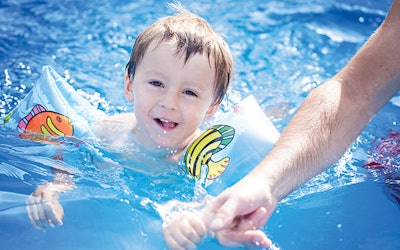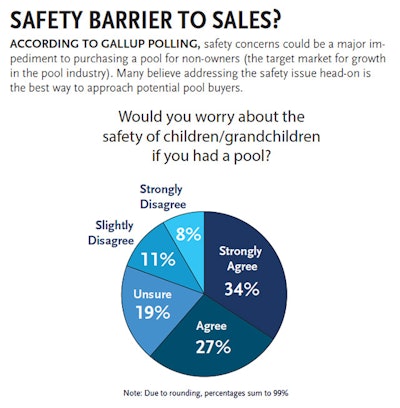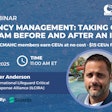
Last fall APSP hired leading consumer research firm Gallup to poll pool owners and non-owners about their attitudes toward its members' products. The company gathered more than 4,000 completed surveys covering a wide range of pool-related issues, including key drivers behind decisions to buy and factors that prevented non-owners from considering pool purchases.
Many results were predictable and positive, such as the value consumers placed on the family togetherness and health benefits pools offer. Other results should give pool pros pause. Asked whether they would worry about the safety of their children or grandchildren in a backyard pool, more than six in 10 non-owners said they would. Safety concerns among pool owners was nearly as strong, with 55 percent indicating they felt "concerned" or "strongly concerned" about it.
These fears were even cited as a reason for not considering putting in a pool by nearly one if five respondents without one.
"One way to get those homeowners to feel more comfortable is to identify the hazards, then come up with countermeasures to make sure those hazards don't take place," says Carvin DiGiovanni, vice president, technical and standards, for APSP. "We basically turn it into a very big positive. What I tell our contractors is they should bring it to the forefront. That shows the homeowner that you're not afraid to talk about safety, that in fact you're embracing it and pitching it to the homeowner. You're saying, 'I'm not here to just build a pool, take a check and then walk away. I'm concerned that you are very aware of these safety things because I don't want anyone to get hurt in this pool or spa. I want you to have an enjoyable time, but there are some things you need to be aware of.'"
Month of Messaging
There was a time when many pool professionals shied away from talking to customers about safety. Bringing up potential dangers, the thinking went, was likely to scare buyers away. Though that attitude has largely disappeared, any lingering inclinations against a frank discussion of safety need to be purged, says DiGiovanni.
We caught up with DiGiovanni in mid-May, the height of National Water Safety Month, during which APSP and key sponsors like Pentair take an active role in spreading the word about water safety. "The idea, obviously, is to lead an interested group of aquatic organizations and make a coordinated effort," DiGiovanni says. "We wanted to take the lead, and along with us we've got a lot of partners helping us out, not just during May but throughout the year. Talking about the different layers of protection and the crucial role constant adult supervision plays in children's safety are as important as talking about design, construction and cost. And, as the survey data shows, people are thinking about it anyway."
The association's website, APSP.org and NationalWaterSafetyMonth.org, has links for consumers offering safety tips, event-planning resources for dealers, posters, pamphlets, articles and even an app from the Red Cross. In short, if it's got to do with swimming and safety, you'll find it on these websites.
"The kind of financial sponsorship we get from companies like Pentair is very helpful in allowing us to foster safety awareness and safety education in May and the rest of the year," DiGiovanni says. "We can take their dollars and turn around and support various safety organizations, and we can actually start to do other initiatives, such as research. So there's a lot we can do."
One new initiative for 2016 is called Check a Drain, which is meant to raise awareness among homeowners and pool operators about the dangers of pool drains that are missing, broken or loose.
"There's no law that backyard pools need to be checked for safe drains," DiGiovanni says. "There are 300,000 public pools out there that are now protected by Virginia Graeme Baker Act and must be checked for compliance, but when it comes to residential pools you've got 10 to 12 million that aren't covered."
APSP has been advocating changes to building codes, pushing for states to adopt the International Swimming Pool & Spa Code, which it developed with the ICC to give residential pools the same level of protection afforded to commercial ones (see, "Cracking the Code," p. 26, Nov. 2015 issue of AQUA). While the association is hoping for widespread adoption of the new code, it's been ramping up messaging aimed at homeowners.
"The new Check a Drain initiative is really important to me," DiGiovanni says. "First, we want to get commercial pool operators to go back and check on the drains that were replaced when VGB became law. Then we want to go into the backyards and get the word out to people who probably have no clue about VGB. We tell the media, we sent press releases to all the manufacturers. It's all part of the awareness outreach, to get everybody in the chain, if you will, to be aware of the potential danger of a missing, loose, or damaged drain cover.
"Because there are some states with no laws about this, it really makes it critical that we do everything we can to get the word out. We don't just want to sell drains, we want people very aware of the potential danger. Look in the pool or spa. If the drain is broken or missing, you don't go in until it is replaced with a VGB compliant cover. It's as simple as that."
It's a message DiGiovanni and APSP's large coalition of the concerned pushed hard in May and will continue to push until National Water Safety Month rolls around again next year.
"Bring attention to the homeowner that that open bodies of water do present potential danger," DiGiovanni says. "There are products and devices that can assist, but the best layer of protection to prevent drowning is constant adult supervision. That's the most important by far."

Proclamation and EducationGovernors unanimous in support of water safety On May 1, Governor Terence McAuliffe signed a certificate proclaiming May as National Water Safety Month in the Commonwealth of Virginia. In fact, governors in every other state in the union joined McAuliffe and signed similar proclamations this spring. ("Whereas, the citizens of [state] recognize the important role that water-related activities can play in good physical and mental health…") If DiGiovanni had his way, they would go the extra step and join Virginia by adopting the International Swimming Pool & Spa Code that he and other industry advocates have been pushing for. "Getting governors to sign those proclamations is just one part of our initiative, but it's an important one for because it gets picked up and spread by media across the country," DiGiovanni says. "More than anything else, getting the word out is what National Water Safety Month is about." |







































